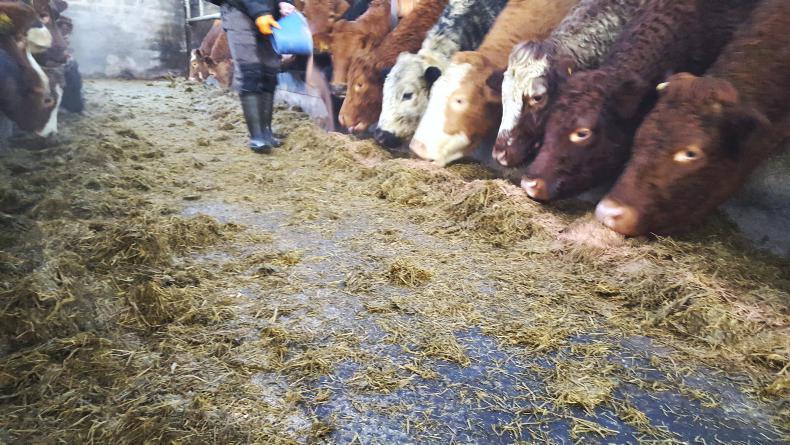Pre-calving minerals should be fed to pregnant cows six to eight weeks before calving to build up mineral reserves within the body.
This means for early spring-calving calving herds, minerals should be introduced now, while for later spring-calving herds, supplementation should start around Christmas.
Function of minerals
The function of minerals for an animal can be divided into four main categories:
Skeletal development – calcium, phosphorous, magnesium.Energy – phosphorous, copper, zinc, manganese, se.Milk production – calcium.Bodily functions – magnesium, potassium, sodium, chlorine, sulphur, cobalt, iodine, iron.Feeding minerals
Minerals are most commonly fed by dusting on top of the silage at feeding time. However, other options include through water systems, molassed mineral buckets and/or a carrier ration.
Furthermore, trace elements can be supplied in boluses, but this method will not cover for major elements.
Where minerals are being dusted on silage or fed through a carrier ration, it is vital to ensure that there is enough feed space for each animal to feed.
More often than not, it is the same weaker animal that is bullied away from the feed face where space is limited, leaving her at risk of receiving no minerals.
Mineral composition
Table 1 gives a sample breakdown of the major elements, trace elements and the vitamins to look for in a pre-calving mineral mix, as well as the recommended quantities of each.
Different brands of minerals will specify different feeding rates depending on the concentration of the mix. This will usually be around 100g to 120g per cow daily.
Always allocate according to the specified feeding rate and use a weighing scales and a designated utensil to do this.
It is also very important to consider the mineral composition of the silage. In general, major elements in grass tend to match animal requirements, but deficiencies can occur.
On the other hand, trace element levels in grass are typically lower than required and consequently need to be supplemented at key periods during the year including pre-calving.
One common example can be magnesium deficiency in cows as a result of high phosphorous levels in silage. Phosphorous locks up magnesium.
While pre-calving minerals are designed to do exactly this, a significant deficiency of some trace elements may require extra supplementation in the form of boluses or pour-ons, for example.
Pre-calving minerals should be fed to pregnant cows six to eight weeks before calving to build up mineral reserves within the body.
This means for early spring-calving calving herds, minerals should be introduced now, while for later spring-calving herds, supplementation should start around Christmas.
Function of minerals
The function of minerals for an animal can be divided into four main categories:
Skeletal development – calcium, phosphorous, magnesium.Energy – phosphorous, copper, zinc, manganese, se.Milk production – calcium.Bodily functions – magnesium, potassium, sodium, chlorine, sulphur, cobalt, iodine, iron.Feeding minerals
Minerals are most commonly fed by dusting on top of the silage at feeding time. However, other options include through water systems, molassed mineral buckets and/or a carrier ration.
Furthermore, trace elements can be supplied in boluses, but this method will not cover for major elements.
Where minerals are being dusted on silage or fed through a carrier ration, it is vital to ensure that there is enough feed space for each animal to feed.
More often than not, it is the same weaker animal that is bullied away from the feed face where space is limited, leaving her at risk of receiving no minerals.
Mineral composition
Table 1 gives a sample breakdown of the major elements, trace elements and the vitamins to look for in a pre-calving mineral mix, as well as the recommended quantities of each.
Different brands of minerals will specify different feeding rates depending on the concentration of the mix. This will usually be around 100g to 120g per cow daily.
Always allocate according to the specified feeding rate and use a weighing scales and a designated utensil to do this.
It is also very important to consider the mineral composition of the silage. In general, major elements in grass tend to match animal requirements, but deficiencies can occur.
On the other hand, trace element levels in grass are typically lower than required and consequently need to be supplemented at key periods during the year including pre-calving.
One common example can be magnesium deficiency in cows as a result of high phosphorous levels in silage. Phosphorous locks up magnesium.
While pre-calving minerals are designed to do exactly this, a significant deficiency of some trace elements may require extra supplementation in the form of boluses or pour-ons, for example.






 This is a subscriber-only article
This is a subscriber-only article









SHARING OPTIONS: